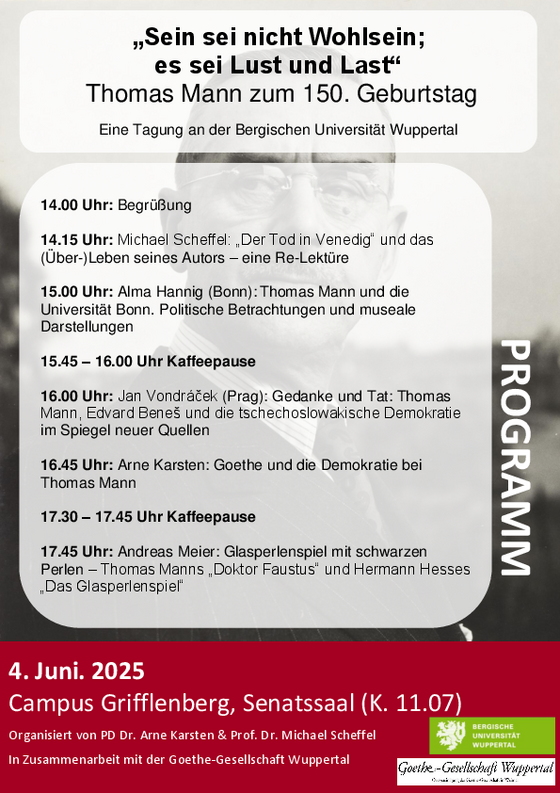Invitation
Study day on the 150th birthday of Thomas Mann

Click on the poster: Larger version
Entitled "'Sein sei nicht Wohlsein; es sei Lust und Last' - Thomas Mann zum 150. Geburtstag", the conference combines literary and historical approaches in order to shed light on central themes in the writer's work and influence. The event begins at 2 p.m. in the Senate Room (K.11.07) on the Grifflenberg campus. The interested public is cordially invited. Registration is not required and admission is free.
The programme will focus on issues such as Thomas Mann's relationship to democracy, his connection to the University of Bonn, his engagement with Goethe and his literary dialogue with Hermann Hesse.
Excerpts from the programme
- 14.15 Prof. Dr Michael Scheffel (Wuppertal): "Death in Venice" and the (over)life of its author - a re-reading
- 3 p.m. Dr Alma Hannig (Bonn): Thomas Mann and the University of Bonn. Political considerations and museum representations
- 4 p.m. Dr Jan Vondráček (Prague): Thought and action: Thomas Mann, Edvard Beneš and Czechoslovak democracy as reflected in new sources
- 16.45 PD Dr Arne Karsten (Wuppertal): Goethe and democracy in Thomas Mann
- 17.45 apl. Prof. Dr Andreas Meier (Wuppertal) : Glass Bead Game with Black Pearls - Thomas Mann's "Doctor Faustus" and Hermann Hesse's "The Glass Bead Game"
Thomas Mann (1875-1955)
Thomas Mann was one of the most important German writers of the 20th century and was awarded the Nobel Prize for Literature in 1929 for his novel "Buddenbrooks". His work includes novels such as "The Magic Mountain" and "Doctor Faustus", in which he dealt with issues of culture, illness and politics, among others. During the Weimar Republic and his years in exile from 1933 onwards, Mann campaigned against National Socialism and spoke out in favour of democratic values in speeches and essays.
